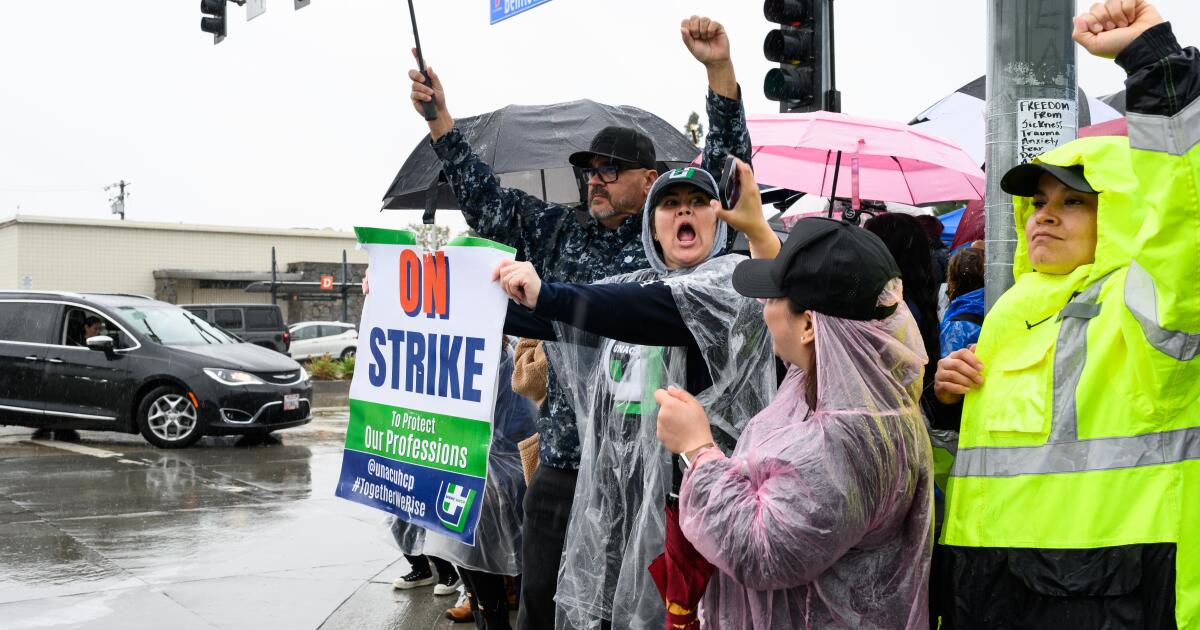A five-day strike that affected hundreds of Kaiser Permanente clinics and hospitals in California and Hawaii came to an end after the union representing workers said it had “new momentum” to head back to the bargaining table, but no apparent agreement has been reached.
“This strike may be over — but the fight for patient safety is not,” the United Nurses Assns. of California/Union of Healthcare Professionals, known as UNAC/UHCP said in a statement. “Caregivers are returning to work united, energized, and ready to keep up the pressure for a fair contract that puts patients first.”
Kaiser and union officials are set to resume bargaining on Wednesday and Thursday.
The union requested a wage increase of 25% over four years, an ask that union officials have said was needed to compensate for the smaller 2% increases workers received in the first year as part of their 2021 contract negotiations.
The union has also pushed for the additional hiring of more staff, and proposed an internal registry of on-call union nurses, so that the company doesn’t rely on contracted traveling nurses.
Kaiser officials have argued that employees on average earn 16% more than peers in the industry, and that the wage increases proposed raised their “already above-market wages over the 4-year contract.”
Company officials said the company offered a 21.5% wage increase over four years before the strike was called, as well as additional improvements to medical plans and retiree benefits.
Kaiser officials said workers returned to work Sunday at 7 a.m.
During the strike, facilities were staffed with doctors, managers and nearly 6,000 contracted nurses and clinicians to minimize disruption to care, officials said.
On Sunday, the UNAC/UHCP announced the end of the strike, stating that the labor action was “sending a resounding message that patient care and safe staffing must come first.”
The union pointed to new staffing standards released by the Joint Commission, a nonprofit that accredits healthcare organizations, that recognized adequate staffing as a component of providing needed care.
The new standard moves staffing levels away from an employer’s choice that could be affected by budget constraints, to a patient safety standard, the union said in a statement.
“The Joint Commission has finally said what nurses have known all along: Unsafe staffing is unsafe care,” said Charmaine S. Morales, president of the UNAC/UHCP in the statement. “It’s now a national patient safety mandate — and UNAC/UHCP will make sure it’s enforced.”
Officials at Kaiser said it was welcoming back the 30,000 employees who went on strike, but in a statement said the main point of contention at the bargaining table has been wages, not staffing.
“While the Alliance has publicly emphasized staffing and other concerns, wages are the reason for the strike and the primary issue in negotiations,” said Terry Kanakri, spokesperson for Kaiser, in a statement.
During bargaining, “the focus will be on economic issues,” Kanakri said in the statement. “At a time when the cost of healthcare continues to go up steeply, and millions of Americans are having to make the difficult choice to go without coverage, it’s critical that we keep quality, accessible healthcare coverage affordable.”
Meanwhile union officials have blasted the company for holding $66 billion in reserves and expanding projects in other states.
This story originally appeared on LA Times

